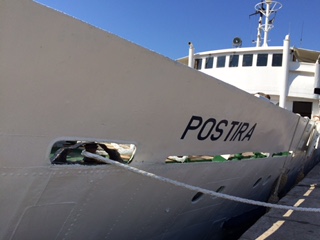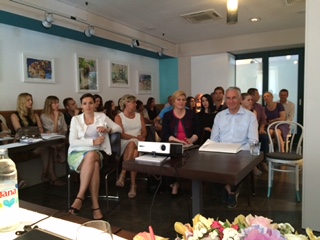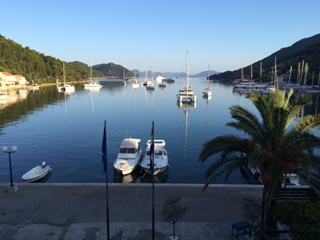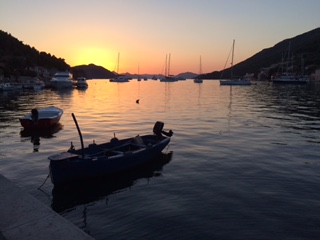BREXIT AND THE CONSEQUENCES FOR ENLARGEMENT
The following text is a background paper for a speech given at the 15th International Summer School organized by the Atlantic Council of Croatia and the International Institute for Peace on the Croatian island of Sipan, July 2016. Sipan is a very small and extremely nice island off the coast of Dubrovnik. From there one can go with an old fashioned and positively nostalgic boat, the Postira to Sipan, when one arrives after something more than one hour. And some minutes with the bus and one arrives at beautiful Sipanska Luka, the place of the summer school. This year also the president of Croatia, Kolinda Grabar-Kitarovic, took part in the same morning session where I gave my speech. There were many points of agreement and some small differences. But I was happy to meet her again, as I cooperated with her, when she was foreign minister beyond the political dividing line between her being a conservative politician and me as European Socialist. And she still represents a very moderate and sensible foreign and security policy line.
BREXIT IS NOT AN EASY THING TO MANAGE
The turmoil Brexit was and is creating visible in Britain but also all over the European continent. Brexit has also consequences for enlargement. The already existing enlargement fatigue is enormously strengthened by Brexit. The chaos and uncertainties not only in the UK but also inside the EU has been supporting the view, that we first have to do the necessary reforms inside the EU. We first have to bring our own house in order, before we can think about extending it. And we know that such a reform process needs a lot of time in the EU. Of course things may change and new attitude may come forward, but the already existing enlargement fatigue will not disappear quickly in the contrary. And the longer enlargement is postponed, the more enlargement fatigue will rise in some enlargement countries.

One can of course argue, that the Brexit decision has nothing to do with the EU as such. If one looks to the voting pattern at the referendum the decision for remaining or leaving the EU was dependent on the general attitude towards openness or closeness in different areas and social groups of the country. People living in multicultural environment and high percentage of modern service jobs like in London voted for remaining inside the EU. Those in depressed area with high unemployment and precarious jobs voted for Brexit. And even high EU subsidies could not change that voting behavior of the disappointed and neglected citizens. In a simple way one could say, the winners of globalization voted for remaining, the losers of globalization votes for leaving the EU.
This general line is valid not only in Britain but also on the continent and even for the US. In a contribution „The Truth About Trade“ in „Foreign Affairs“ Douglas A. Irwin said about the opposition to trade agreements in the US: „These critics come from both sides of the political divide, but they tend to be lower-income, blue-collar workers, who are the most vulnerable to economic change. They believe that economic elites and the political establishment have looked out only for themselves over the past few decades. As they see it, the government bailed out banks during the financial crisis, but no one came to their aid.“
What ever the real facts – and unemployment has much more to do with technological progress than with trade and immigration – the EU nevertheless must react and make Europe more transparent and efficient. EU should become an organization moderating globalization effects, at least the negative ones and not promoting it uncritically . But against the slogans of the populists it would be self-destructive to close and isolate the EU and individual member countries. But we must give citizens the feeling to be better protected, and we should also do it without defeating our economic dynamism.
BREXIT, TURKEY AND UKRAINE
Concerning the enlargement process with Turkey a new situation had been created as the – yet unknown – relationship of the EU with Great Britain may create an example for the relationship between EU and Turkey. It could be a relationship of strong economic ties without opening of the labour market and a strong security connection without a all too strong harmonization concerning the judicial sector. Such a specific and selective relationship may also be a suitable model for the relationship of the EU with Ukraine.

At the moment many variations concerning a joint common market plus or minus some elements are discussed. In this respect the relationship with Norway is taken as an example as also the relationship with Switzerland. In all cases it is a complex relationships with rights and duties and must avoid cherry picking. Anyway a new form of associated membership has to be considered, whereby not all associations agreements must be of the same kind. And such association must not exclude membership at a later stage.
BREXIT AND THE NEW EU PROPER
The inner core of the EU which could be the core of present and future Euro countries would have a ring of countries which would have close connection to the EU. But they would be not members with the specific advantages and obligations of full member countries. That could create a new model of a two tier EU. In this respect the core EU could be the Eurozone which would of course be open to all members and should be composed of all members as soon as the respective national economic conditions are met. If strengthening of the Eurozone would be in contradiction to some countries aspirations, It would be up to the individual countries to decide to join the outer ring with less rights and less obligations.
On the other the new EU could also delegate some issues back to the national or sub national – regional and local level. A strong core needs not to have powerful competences for every issue, the EU may concentrate itself on some basic issues like foreign and security policies and basic economic issues necessary to win the global competition. In addition the EU must be a motor of sustainable growth with its protection of the environment and also develop a joint immigration, refugee and asylum policy. But many details how to implement these aims could be left to the national level and that could also be done in a competitive form by different member countries.
At present even the Austrian Hungarian empire is seen as a model for the future of the EU as recently written in an article of the prominent Spanish newspaper El Pais. Yes, it is true and again and again I draw the attention to the core competences of the union inside the past empire: foreign policy, defense and trade. And I often say, the Austrian Hungarian empire was a nucleus of today’s EU, unfortunately too early in time. Of course today we have to add our responsibility to global issues like sustainability of development and basic human rights. And that includes also a human and realistic refugee policy.
FLEXIBILITY AND ENLARGEMENT OF THE BALKANS
Although a restructuring of the EU would mean that the EU could be organized and act more flexible, that does not mean that enlargement by the – smaller – Balkan/South Eastern countries would be easier. The restructuring of the EU will need time and new members could create new difficulties and pose new questions. How to use this time of EU’s phase of consideration and reorganization? One should think of intermediate steps of rapprochement in order to prevent long intervals of uncertainty and stagnation. A strong economic and security alliance should be envisaged without the critical elements of membership – at least for the time being. Although many people in the Balkans just want freedom movement and that is their strongest motive and incentive for membership, we must confess that this is the most critical, not to say negative element from the side of many citizens inside the EU. The minimum would be to decide on a reform of the „Posting of Workers Directive“ which should guarantee the same wage for the same work at the same place.
Anyway it would not be a black and white issue and as already now many citizens from Balkan countries would continue to work inside the EU. But besides a new and efficient „Posting of Workers Directive“, individual countries would have the possibility to impose restrictions if a certain level of unemployment would be surpassed. The same would be true, if a greater number of refugees would be accepted by the respective country. This is not an answer for all times, but as long as unemployment is high and the EU and individual countries have not found a way to reduce unemployment I do not see any alternative.
One must also confess that the free movement of labour inside the EU has been agreed and promoted as an important pillar of the EU at different times and with different conditions. It was thought that the reduction of the different levels of economic well being and social standards could be reached within few years after accession. But that is not the case. And in addition the refugee issue was not as high on the agenda as today. Maybe the promise of free movement of labour was given too automatically without thinking about the necessary conditions under which this promise could be implemented. And to make it clear again, it would be absolute foolish and counterproductive to close countries labour markets and return (?) to isolation. This promise of the populists would be harmful and will never be realized. But some possibility to be flexible according to the respective national conditions could be envisaged. But our major aim must be to commit an economic policy of growth and jobs and not concentrate on preventing labour to move between countries.
And in addition the EU must promote the economic growth and job creation in our neighborhood especially South Eastern Europe. In a recent study of the WIIW Balkan Observatory, the authors come to the following conclusion: „We find that there has been some income convergence in Europe, but mostly in countries that were able to exploit the “ advantages of-mild-backwardness“. Areas of excessive backwardness such as the Balkans had difficulties to catch up.“ But without catching up a full membership with full freedom of labour movement will be hardly accepted by the EU citizens. And catching up needs many measures by Balkan countries themselves but also by the EU.
FROM REGIONAL COOPERATION TO A BALKAN BIG BANG?
What does that mean for the countries in the waiting room to the EU. In all cases the waiting time should be used productively not only by the necessary domestic reforms but also by strengthening the regional cooperation in the Balkans. Already now and with the support of the „Berlin Process“ this cooperation has shown stronger willingness to be enhanced by the governments of the Balkan. This cooperation would be also helpful in case the EU would take the countryside only as a block in the sense of a „Big Balkan Bang“. This may be unfair to the most advanced countries but it may also increase the peer pressure of neighboring countries on those lagging behind.

Of course one issue which is a vital one for the EU and the Balkan/South Eastern countries is the defense and control of the Schengen border. The Schengen border is going through the region and will so even more when Croatia is joining Schengen. On the other hand, if the Schengen border in Greece would be better controlled it would be of big benefit not only for Macedonia but for the whole region. And it is even possible, that the countries of the region join the Schengen zone before joining European Union. But that needs a strong and effective security policy by all south eastern countries including border controls along the Adriatic Sea. And as we have seen with the refugee influx a strong cooperation of the Balkan countries and then such a cooperation across Europe is of vital importance.
One of these issues concerning security is also the rise of the still small but existing cells of radical Islam if in connection with ISIS or not. The countries concerned should not be ashamed of it and hide it. They should deal in effective way with these phenomena and cooperate with European security forces. But they must have a comprehensive and precautionary policy. Anyway we should be careful about the dangers for the traditional tolerant and peaceful European form of Islam of South Eastern Europe which is a good example of the peacefully living together irrespective of religious beliefs. We must prevent a contagion by small but effective radical Islam. Also concerning this issue we need a close cooperation of all countries in South Eastern Europe.
BREXIT, NATO AND RUSSIA
Brexit and its aftermath has not only influenced the EU and Its enlargement. It has also importance for NATO. NATO will be the only strong political organization in which Great Britain and the EU countries would be united. And of course other countries like the US and Canada would be involved too. So NATO will be of rising importance. And that may also affect the general security situation in the whole of Europe and specifically the relationship to Russia.
Russia sees the development after the break down of the Soviet union as an unfair extension of western dominance. And de facto the Russian influence and interests zone was reduced because the Russian weakness was used by the EU but especially NATO to extend its membership and area of influence. The West on the contrary sees the Russian reaction as an imperialistic attack against countries who want to choose a different course than Russia has in mind – dreaming its imperialistic dreams of the past. Both interpretations have some truth in it and together Russia, the EU and NATO should find a way out of useless and harmful confrontations and think about a new sustainable peace structure for Europe.
In this respect Michael Mandelbaum wrote in a recent article in „The American Interest“: „Instead of expanding NATO, the United States and its allies could have found ways to include Russia in a new European security system… This would not necessarily have ensured the establishment of political democracy there, but it would surely have effected Russian foreign policy… Including Russia in a new European security order would (also) have given the West more influence over Russian foreign policy than excluding it provided“. Now it seems too late and too early due to the present aggressive Russian policy, but a change may come and we would have to use it courageously. And we have to test Russia again and again if it would be ready to start talks with the West on a realistic European security system.
For the moment the Balkans is one area of competition of these different and often opposing interests. And as long as there is no understanding between the West and Russia how to live together and cooperate in Europe we will always have that controversy about how much countries are free to choose their destiny. And I fear Russia will continue to try to influence developments in Europe and the Middle East by unilateral actions. In some cases there will be a direct Russian military intervention and in other cases there will be „only“ a Russian media and communication intervention. So the question is, how we can combine strength and determination of NATO with new ideas for a comprehensive European security framework, where NATO and Russia can find an acceptable position. The Balkan countries would certainly benefit from a new all – European security structure, which would also reduce Russian media activities which are often misinformation activities.
NEW TURKISH FLEXIBILITY
And of course concerning the Western Balkans also Turkey plays an important role. As we saw recently after some very hard line positions concerning Israel and Russia, Turkey is developing actually a more flexible attitude and tries to return to a „no problems with its neighbor policy“. And that may give it a stronger position also in the Balkan region. And Turkey as a NATO country of its own with good relations to Russia and a special relationship to the EU could contribute an important regional role.

But at the moment Turkish policy is very volatile and unpredictable. Nearly everything depends on President Erdogan and his domestic and foreign policy attitudes. And these attitudes are mixed with religious aspirations as well. At the moment he shows new flexibility and that may have positive results in Cyprus. And probably specific energy interests are behind this turn in Turkey’s foreign policy because Russia as well as Israel are important partners for an energy policy in the interest of Turkey’s sufficient supply especially with gas. In all cases the EU should make it clear that if the EU looks for some alternatives to accession that should not prevent full membership at some later date. An extended association of Turkey like with Ukraine and Great Britain should be seen as solutions of mutual benefits.
BALKANS MUST STAY ON AGENDA OF EU
Brexit will have an influence also on the speed and readiness of EU countries to bring the countries of Europe’s South East into the EU. But whenever that will take place we must not loose sight of that important step of European unification and we must use the time on both sides to prepare ourselves for the accession of new members. And the recent conference in Paris in the framework of the Berlin process reiterated that willingness. Nevertheless, it will take longer as foreseen until full integration into EU including freedom of movement for labour will be realized. But many steps could and should be done in between. Especially on security and border issues we should have a strong cooperation. And EU and the respective countries themselves should promote more investment to create more jobs on the region itself. And very important is the regional cooperation to show the readiness and willingness for integration. If the EU will continue to take countries individually or as a block, in any case regional integration is paramount.
